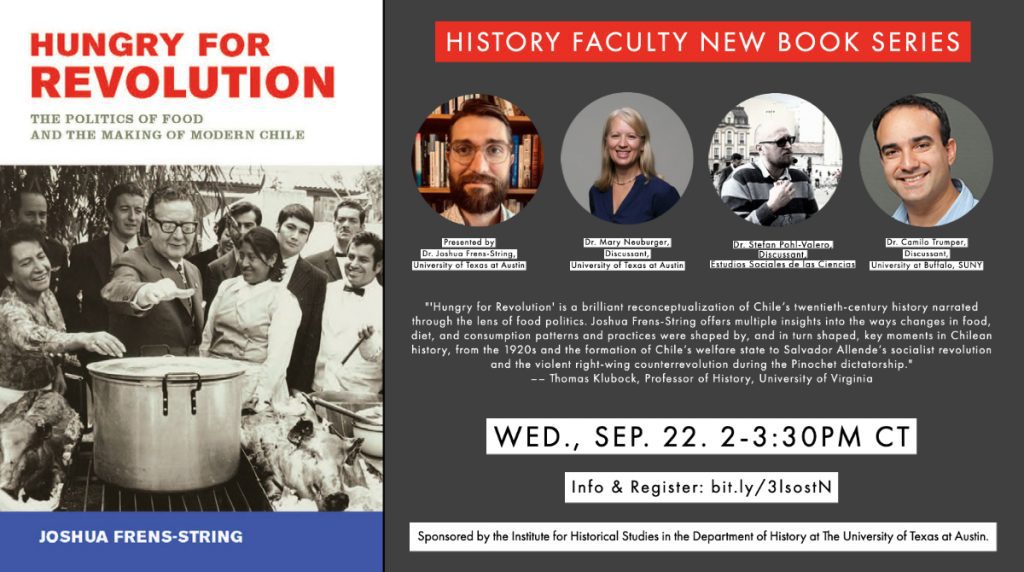
Institute for Historical Studies – Wednesday, September 22, 2021
Introducing the book
Hungry for Revolution (University of California Press, June 2021) tells the story of how struggles over food fueled the rise and fall of Chile’s Popular Unity coalition and one of Latin America’s most expansive social welfare states. Reconstructing ties among workers, consumers, scientists, and the state, Joshua Frens-String explores how Chileans across generations sought to center food security as a right of citizenship. In so doing, he deftly untangles the relationship between two of twentieth-century Chile’s most significant political and economic processes: the fight of an emergent urban working class to gain reliable access to nutrient-rich foodstuffs and the state’s efforts to modernize its underproducing agricultural countryside.
Notes from the Director
Hungry for Revolution (University of California Press, June 2021) is an ambitious book that offers a radical new chronology of the political history of 20th century Chile and offers a striking new genealogy of Allende’s Socialist Revolution. This roundtable with specialists on the history of nutrition science and technocracy in 20th century state formation in Central Europe and Latin America leaves a number of tantalizing questions open, the subject of future conversations:
Did Chile have a nutrition oriented welfare state before the USA did? Was the welfare Chilean state and its focus on nutrition something Chileans picked up from the global north in the 1920s and 30s? Or is this idea of the global north one that helps the north establish a rhetorical claim over innovation and modernity when things originate in multiple places and centers? How did the international policies in nutrition as indicators of public health come about? Are welfare state policies of nutrition in of themselves positive? Or are states responsible for creating nutritional needs and markets that were not deeply entrenched in society previously? Is socialism the only direction Chile’s consumer oriented welfare state could have taken? The emphasis on Pinochet and the coup could make us forget that Nazism, fascism, and totalitarian communism witnessed their own forms of welfare policies of nutrition too. What do the Chilean campaigns to expand consumption of seafood, as an alternative to beef, tell us about a distinct Pacific rim nutritional technocratic revolution in the mid 20th century, from Japan to Peru to Chile?
Praise for the book
- “Hungry for Revolution is a terrific history of the importance of food in struggles over national modernization and democracy in twentieth-century Chile. It radically reframes debates about consumption to show how food was central to empowering poor people as Chilean citizens.”
––Heidi Tinsman, author of Buying into the Regime: Grapes and Consumption in Cold War Chile and the United States - “This creative, deeply researched study offers scholars the opportunity to rethink some of the key narratives of twentieth-century Chilean history, re-envisioning the story of Chilean state formation as inextricably connected to everyday struggles. Not only will Hungry for Revolution shape Chilean history, but its impact promises to reverberate in the history of Latin American and political histories for years to come.”
––Camilo D. Trumper, author of Ephemeral Histories: Public Art, Politics, and the Struggle for the Streets in Chile - “Hungry for Revolution is a brilliant reconceptualization of Chile’s twentieth-century history narrated through the lens of food politics. Joshua Frens-String offers multiple insights into the ways changes in food, diet, and consumption patterns and practices were shaped by, and in turn shaped, key moments in Chilean history, from the 1920s and the formation of Chile’s welfare state to Salvador Allende’s socialist revolution and the violent right-wing counterrevolution during the Pinochet dictatorship.”
–– Thomas Klubock, Professor of History, University of Virginia
Author and discussants
Dr. Joshua Frens-String is an assistant professor of Latin American History at the University of Texas at Austin and an affiliate of the Teresa Lozano Long Institute of Latin American Studies (LLILAS). He received his Ph.D. in History from New York University in 2015. Frens-String’s first book Hungry for Revolution: The Politics of Food and the Making of Modern Chile (University of California Press, 2021) tells the story of how struggles over food fueled the rise and fall of Chile’s Popular Unity coalition and one of Latin America’s most expansive social welfare states. Reconstructing ties among workers, consumers, scientists, and the state, Frens-String explores how Chileans across generations sought to center food security as a right of citizenship. In so doing, he untangles the relationship between two of twentieth-century Chile’s most significant political and economic processes: the fight of an emergent urban working class to gain reliable access to nutrient-rich foodstuffs and the state’s efforts to modernize its underproducing agricultural countryside. From 2015-2017, Frens-String was an editor of the NACLA Report on the Americas, one of the most widely-read English-language quarterlies on Latin America and its relationship with the United States. He is currently the book review editor at the journal International Labor and Working-Class History (ILWCH). Follow his work on Twitter at @jf_string.
Featured discussants:
Dr. Mary Neuburger
Professor of History; Director of the Center for Russia, East European and Eurasian Studies; Chair of the Slavic and Eurasian Studies; and Provost Teaching Fellow, at The University of Texas at Austin.
Dr. Stefan Pohl Valero
Associate Professor of the History of Science and Medicine
Universidad del Rosario, Bogotá
Dr. Camilo Trumper
Associate Professor of History
University at Buffalo, State University of New York SUNY
Read Dr. Frens-String’s feature, “Tasting Empanadas and Red Wine in Chile’s Popular Unity Revolution,” on Not Even Past.
This discussion is part of the IHS History Faculty New Book Series.
The views and opinions expressed in this article or video are those of the individual author(s) or presenter(s) and do not necessarily reflect the policy or views of the editors at Not Even Past, the UT Department of History, the University of Texas at Austin, or the UT System Board of Regents. Not Even Past is an online public history magazine rather than a peer-reviewed academic journal. While we make efforts to ensure that factual information in articles was obtained from reliable sources, Not Even Past is not responsible for any errors or omissions.



